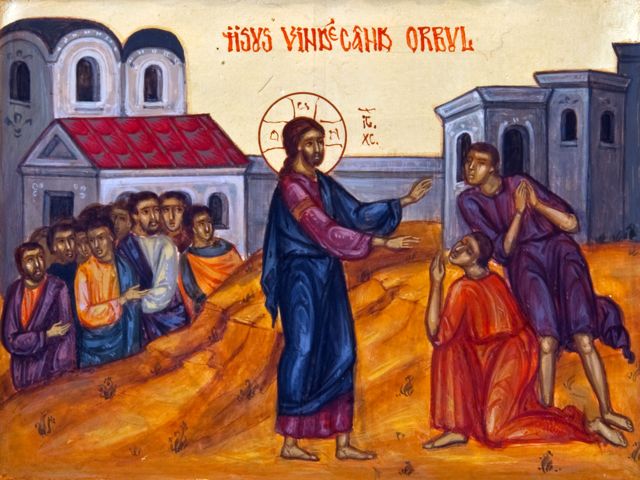First Reading — Numbers 11:25-29
26 Now two men remained in
the camp, one named Eldad, and the other named Medad, and the spirit
rested upon them; they were among those registered, but they had not
gone out to the tent, and so they prophesied in the camp. 27
And a young man ran and told Moses, “Eldad and Medad are
prophesying in the camp.” 28 And Joshua the son of Nun, the minister of Moses,
one of his chosen men, said, “My lord Moses, forbid them.” 29
But Moses said to him, “Are you jealous for my sake? Would
that all the Lord’s people were prophets, that the Lord would put
his spirit upon them!”
2. Does the Spirit work in religions other than your own? Ever? Always? What might the Spirit be doing in them? Do gifts in other peoples help you to see what God might be doing through them? If the origin of a gift is not clearly from the Spirit, would “By their fruits you shall know them” be a good test?
3. Contrast the attitudes of Joshua and Moses
Second
Reading — James 5:1-6
1 Come now, you rich, weep
and howl for the miseries that are coming upon you. 2 Your
riches have rotted and your garments are moth-eaten. 3 Your
gold and silver have rusted, and their rust will be evidence against
you and will eat your flesh like fire. You have laid up treasure for
the last days. 4 Behold, the wages of the laborers who
mowed your fields, which you kept back by fraud, cry out; and the
cries of the harvesters have reached the ears of the Lord of hosts. 5
You have lived on the earth in luxury and in pleasure; you have
fattened your hearts in a day of slaughter. 6 You have
condemned, you have killed the righteous man; he does not resist you.
1. Wages withheld from the harvesters cry aloud to the Lord of hosts, James says. How does this message apply today to arguments for a federal minimum wage hike or buying Fair Trade coffee? Or beefing up laws that would end human trafficking?
2. James says that the rich in this reading got their wealth at the expense of the poor. How would the harvesters in the reading feel this? How would humane treatment from the rich relate to a living wage? To profound respect?
- How should we relate to the spiritual success of other Christians?
- What is the root cause of jealousy, selfishness and greed?

Gospel
Reading — Mark 9:38-43,
45, 47-48
38
John said to him, “Teacher, we saw a man
casting out demons in your name, and we forbade him, because he was
not following us.” 39 But
Jesus said, “Do not forbid him; for no one who does a mighty work
in my name will be able soon after to speak evil of me. 40
For he that is not against us is for us. 41
For truly, I say to you, whoever gives you
a cup of water to drink because you bear the name of Christ, will by
no means lose his reward.
42 “Whoever causes one
of these little ones who believe in me to sin, it would be better for
him if a great millstone were hung round his neck and he were thrown
into the sea. 43 And if your hand causes you to sin, cut
it off; it is better for you to enter life maimed than with two hands
to go to hell, to the unquenchable fire. …
45 And if your foot causes
you to sin, cut it off; it is better for you to enter life lame than
with two feet to be thrown into hell. … 47 And if your
eye causes you to sin, pluck it out; it is better for you to enter
the kingdom of God with one eye than with two eyes to be thrown into
hell, 48 where their worm does not die, and the fire is
not quenched.
1. What was Jesus’ response to the idea that no one outside the inner circle was to minister in his name? Can anyone lay exclusive claim to the reign of God as Jesus revealed it?
2. The good that every person does should be accepted, Pope Francis says below. How far does he go in accepting good works from others?
“If he is not one of us, he cannot do good. If he is not of our party, he cannot do good.” And Jesus corrects them: “Do not hinder him, he says, let him do well.” The disciples were a little intolerant, closed off by the idea of possessing the truth, convinced that “those who do not have the truth, cannot do good.” This was wrong. ... Jesus broadens the horizon, reminding us that the Lord created us in His image and likeness and we are the image of the Lord, and He does good and all of us have this commandment at heart: do good and do not do evil. All of us. The objection is swift: “But, Father, this is not Catholic! He cannot do good.” Yes, he can. ... The Lord has redeemed all of us, all of us, with the Blood of Christ: all of us, not just Catholics. Everyone! “Father, the atheists?” Even the atheists. Everyone! We must meet one another doing good. “But I don’t believe, Father, I am an atheist!’ But do good: we will meet one another there.
- Why were the disciples opposed to the man who was casting out demons?
- Compare the disciples’ attitude toward this other person who was casting out demons, with the Pharisees attitude toward Jesus’ casting out demons.
- What does Jesus teach regarding our attitude toward others who serve him?




